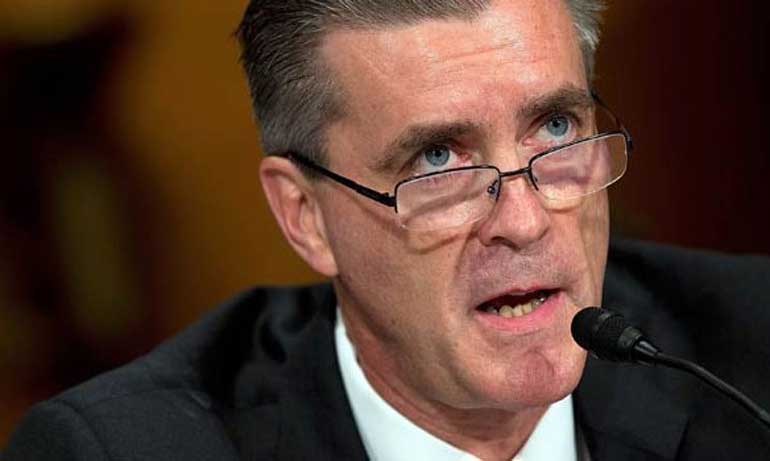Saturday Feb 21, 2026
Saturday Feb 21, 2026
Saturday, 18 July 2015 00:00 - - {{hitsCtrl.values.hits}}
Dawn (Peshawar): While praising sacrifices of the Pakistan Army and Zarb-e-Azb’s “disruptive effect on terrorists” in North
 US Ambassador Richard Olson
US Ambassador Richard Olson
Waziristan Agency, US Ambassador Richard Olson has said that it is time proxy wars in South Asia come to an end.
“I think the era of proxy war in South Asia should come to an end,” said Ambassador Olson, adding that they should end regardless of who was behind such wars in the region.
Talking to journalists here on Saturday, the ambassador acknowledged the sacrifices made by the Pakistan Army in making the operation Zarb-e-Azb a success. The operation was launched in North Waziristan Agency in June 2014.
“We do believe that the operation has had a disruptive effect on terrorists which will benefit in general primarily the Pakistan, its people and Afghanistan as well,” he maintained, stating that the operation’s outcomes have been “very impressive.”
Asked to comment on the army’s claim of having cleared over 90% of North Waziristan Agency of militants in the wake of the operation amid statements from the US Government appreciating its outcomes while also continuing drone strikes, the ambassador said that “we did not speak about these specific counter-terrorism operations for obvious reasons.”
Asked about the accusations of the Afghan Government that militants from Pakistan participated in the insurgency in Afghanistan, he said: “The era of proxy war in South Asia should come to an end.” About the possibility of emergence of the self-styled ISIS phenomenon in Pakistan and Afghanistan, Ambassador Olson said that international terrorist operations had been “enormously disrupted” during the last 14 years. “We are closely watching developments regarding Daesh.”
Naturally, he said, this topic had been discussed with Pakistani authorities that are keeping a watchful eye on developments related to Daesh, but “so far they (Pakistani officials) did not see any indication of [Daesh’s] organised presence in Pakistan.”
“It is very easy for people to put up a black flag but that does not mean that ISIS has support or presence [in Pakistan],” he said. “Anybody can make a black flag, but we need to be vigilant about this issue,” he said.
Ambassador Olson was of the view that in parts of Middle East, the state authority had collapsed with the emergence of ISIS creating space for extremist groups. He said that institutions of the states in this [South Asia] region were “much stronger and certainly in the case of Pakistan it had well-established state authority, [and a] very capable and established military.”
“It is important to support capacity of the institutions in Pakistan and Afghanistan to counter such threats,” he said, adding that in the troubled context of this region, it was important to be vigilant against ISIS.
Ambassador Olson, who took charge in 2012, is likely to leave Pakistan next month. Of his time in Pakistan, he said that the relations between the United States and Pakistan had improved under his watch.
“It seems that there is less anti-Americanism feelings in Pakistan and [we are] more focused on productive aspects of relationship,” he said. “We are not interfering in domestic Pakistani politics. Many years back there was perception that America was intervening in Pakistani domestic politics. We are very careful about it during the past three years. We favour a democratic dispensation that Pakistanis have been enjoying for the last seven years.”
Regarding current situation in Afghanistan, he said that the US Government’s commitment was to train and assist the Afghan forces. He said that Afghan forces had been fighting since 2013 who had performed quite admirably in very difficult circumstances.
He said that Afghan security forces responded very effectively after terrorists attacked parliament that was defeated. About relations between Pakistan and Afghanistan, he said that there had been deep improvement in relations between the two countries since President Ashraf Ghani came to power.
“He (Ghani) made big efforts to reach out to Pakistan. This was not only reciprocated by Pakistan and Nawaz Sharif also visited Afghanistan,” he said, adding that relations between Pakistan and Afghanistan were much more important and now in much better shape.
Replying to a question, he said that there had been considerable speculation about the killing of Osama bin Laden, but the US Government’s version was very clear. “Osama was killed in the Abbottabad raid and his remains were carried out and buried at sea,” he said, adding that the US Government also rejected that Pakistan was aware of the presence of Osama in Abbottabad.